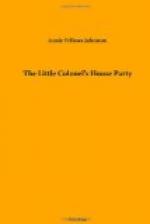“You shall, my dear! I have an old portfolio in the library, full of such things. Poems that she wrote and pictures that Joyce’s mother drew; caricatures of the professors, the little pen and ink sketches of the places in the Valley we loved the best. I’ll get them out for you, after dinner. You will all be interested in them, especially in a journal they kept for me one summer when I was at the seashore. One kept a record of all that happened in the Valley during my absence, and the other illustrated it.”
“Dinner is ready now,” said Lloyd, jumping up as the maid opened the dining-room door. As they all rose to go in, Mrs. Sherman lingered a moment in the hall, to take the paper from Betty’s hand.
“Will you give me this little poem, dear?” she asked, slipping an arm around the child’s waist. “I am very proud of my little god-daughter. The world will hear from you some day, if you keep on singing. Just do your bravest and best, and it will be glad to listen to your music.”
She stooped and kissed Betty lightly on the forehead. It was as if she had set the seal of her approval upon her, and to be approved by her beautiful godmother,—ah, that meant more to the devoted little heart than any one could dream; far more, even, than if she had been made the proud laureate of a queen.
CHAPTER XII.
A PILLOW-CASE PARTY.
They were all sitting on the vine-covered porch, looking out between the tall white pillars into the sultry June darkness. The light from the hall lamp streamed across the steps where the four Bobs rolled and tumbled around over each other, but except for that one broad path of light they could see nothing. There was not even starlight.
“How hot and still it is,” said Mrs. Sherman. “There doesn’t seem to be a leaf stirring, and there’s not a star in sight. I think it will surely storm before morning.”
“Betty,” said Joyce, “your ‘shadowy queen who rules the realms of shade’ has forgotten to put on her crown. Now if I could write poetry like some people I know, I would write an ode to Night and compare it to a stack of black cats. It wouldn’t sound so pretty as your description, but it would be nearer the truth.”
“Well, cats or queens, it doesn’t make any difference what you call it,” said the Little Colonel, “it’s the stupidest night I evah saw. I wish something would happen. It seems ages since we have done anything lively. Now that we are ovah the measles it’s wastin’ time to be sittin’ heah so poky and stupid. What can we do, mothah?”
“Let’s tell ghost stories,” said Mrs. Sherman, who knew what was going to happen in a short time, and wanted to keep the girls occupied until then. “I know a fine one,” she began, sinking her voice to a creepy undertone that made the girls cast uneasy glances behind them. “It’s all about a haunted house that has clanking chains in the cellar, and muffled footsteps, and icy fingers that c-lutch you by the throat on the stairs as the clock tolls the midnight hour.”




